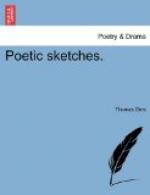To-day I dine—not on my usual fare;
Not near the sacred mount with skinny
nine;
Not in the park upon a dish of air:
But on real eatables, and rosy wine.
Delightful task! to cram the hungry maw,
To teach the empty stomach how to fill,
To pour red port adown the parched craw;
Without one dread dessert—to
pay the bill.
I’m off—methinks I smell the long-lost
savor;
Hail, platter sound! to poet, music sweet:
Now grant me, Jove, if not too great a favor,
Once in my life, as much as I can eat!
SONNET.
ON SEEING A YOUNG LADY,
I HAD PREVIOUSLY KNOWN, CONFINED IN A MADHOUSE.
Sweet wreck of loveliness! alas, how soon
The sad brief summer of thy joys hath
fled;
How sorrow’s friendship for thy hapless doom,
Thy beauty faded, and thy hopes all dead.
Oh! ’twas that beauty’s pow’r which
first destroy’d
Thy mind’s serenity; its charms
but led
The faithless friend, that thy pure love enjoy’d,
To tear the blooming blossom from its
bed.
How reason shudders at thy frenzied air!
To see thee smile, with fancy’s
dreams possess’d;
Or shrink, the frozen image of despair,
Or love-enraptur’d, chaunt thy griefs
to rest,
Oh! cease that mournful voice, poor suff’ring
child!
My heart but bleeds to hear thy musings wild.
TO THADDEUS.[*]
Farewel! lov’d youth, for still I hold thee
dear,
Though thou hast left me friendless and
alone;
Still, still thy name recalls the heartfelt tear,
That hastes Matilda to her wish’d-for
home.
Why leave the wretch thy perfidy hath made.
To journey cheerless through the world’s
wide waste?
Say, why so soon does all thy kindness fade.
And doom me, thus, affliction’s
cup to taste?
Ungen’rous deed! to fly the faithful maid
Who, for thy arms, abandoned every friend;
Oh! cruel thought, that virtue, thus betray’d,
Should feel a pang that death alone can
end.
Yet, I’ll not chide thee—and when
hence you roam,
Should my sad fate one tear of pity move,
Ah! then return; this bosom’s still thy home,
And all thy failings I’ll repay
with love.
Believe me, dear, at midnight or at morn,
In vain exhausted nature strives to rest,
Thy absence plants my pillow with a thorn,
And bids me hope no more, on earth, for
rest.
But, if unkindly you refuse to hear,
And from despair thy poor Matilda save;
Ah! don’t deny one tributary tear,
To glisten sweetly o’er my early
grave.
MATILDA.
[Footnote *: The above lines were written at the request of a Lady, and meant to describe the feelings of one, “who loved not wisely, but too well.”]
SONNET.
TO A LYRE.




